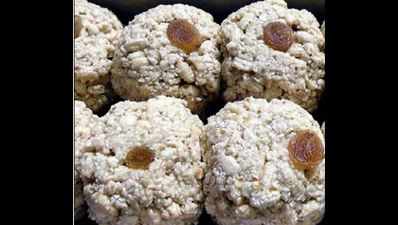- News
- City News
- kolkata News
- Joynagarer moa infested with bacteria, says report
Trending
This story is from December 1, 2016
Joynagarer moa infested with bacteria, says report

KOLKATA: It's soft, stuffed with the goodness of milk and has a generous sprinkling of nuts and resins.One of Bengal's favourite winter delicacies -Joynagarer moa -has delighted generations of sweet-lovers. It's probably as famous as rosogolla. However, it may not be safe for consumption, says a test report.
The best variety of the sweet produced in South 24-Parganas, that was given a GI certification, was found to be bacteria-infested in a laboratory test conducted by Indian Institute of Packaging (IIP).A second test carried out subsequent to changes in the production process, however, revealed no contamination.
The clean chit applies only to a fraction of the moa produced in Joynagar. Of the 800-1,000 quintals churned out from the area, less than 100 are produced by Joynagar Moa Nirmankari Society , that has received the GI tag. Several small sweet shops produce the rest in unhygienic conditions which puts a question mark on the quality of their produce, according to Ashok Kumar Kayal, founder-secreta ry of the society.
“We had sent our samples to IIP seeking to extend the shelf-life of our produce. Moa remains fresh only for three days but we wanted to extend its life. The test report unfortunately revealed bacteria. We have taken immediate steps to alter the source of our ingredients. We now make safe sweets,“ said Kayal.He found it difficult to vouch for the safety of the moas produced en masse in Joynagar. Joynagarer moa is produced and marketed between November and February .
The test report came as a shock to the moa manufacturers, said Kayal. They hurriedly changed their suppliers. “So far, we would procure the khoa from central Kolkata and Burrabazar. Now, we have our own producers who make the khoa in hygienic conditions under strict instructions from us. The produce is safe,“ he claimed.
If the best quality being produced has bacterial contamination, what about the bulk of the produce that sells in Kolkata shops, ask moalovers. It could also be unsafe for consumption, said Mrityunjoy Bandopadhyay , CEO of West Bengal Khadi and Village Industries Board. The IIP report was sent to the board. “It mentions presence of bacteria. We can't recommend such contaminated food,“ he said. IIP suggested proper packaging could extend the shelf-life of Joynagarer moa up to 26 days. “If the ingredients are pure, proper packaging could help,“ he said.
The best variety of the sweet produced in South 24-Parganas, that was given a GI certification, was found to be bacteria-infested in a laboratory test conducted by Indian Institute of Packaging (IIP).A second test carried out subsequent to changes in the production process, however, revealed no contamination.
The clean chit applies only to a fraction of the moa produced in Joynagar. Of the 800-1,000 quintals churned out from the area, less than 100 are produced by Joynagar Moa Nirmankari Society , that has received the GI tag. Several small sweet shops produce the rest in unhygienic conditions which puts a question mark on the quality of their produce, according to Ashok Kumar Kayal, founder-secreta ry of the society.
“We had sent our samples to IIP seeking to extend the shelf-life of our produce. Moa remains fresh only for three days but we wanted to extend its life. The test report unfortunately revealed bacteria. We have taken immediate steps to alter the source of our ingredients. We now make safe sweets,“ said Kayal.He found it difficult to vouch for the safety of the moas produced en masse in Joynagar. Joynagarer moa is produced and marketed between November and February .
The khoa used on the sweet is the source of bacterial contamination, according to Bidhan Das, deputy director and branch head of IIP. “The bacterial contamination was high in the samples sent by Nirmankari Society . Most bacteria were found in the khoa. We suggested changes in the production process and advised them to be careful about the quality of ingredients. A second test was done after they made the changes we suggested and the result was far better,“ said Das.
The test report came as a shock to the moa manufacturers, said Kayal. They hurriedly changed their suppliers. “So far, we would procure the khoa from central Kolkata and Burrabazar. Now, we have our own producers who make the khoa in hygienic conditions under strict instructions from us. The produce is safe,“ he claimed.
If the best quality being produced has bacterial contamination, what about the bulk of the produce that sells in Kolkata shops, ask moalovers. It could also be unsafe for consumption, said Mrityunjoy Bandopadhyay , CEO of West Bengal Khadi and Village Industries Board. The IIP report was sent to the board. “It mentions presence of bacteria. We can't recommend such contaminated food,“ he said. IIP suggested proper packaging could extend the shelf-life of Joynagarer moa up to 26 days. “If the ingredients are pure, proper packaging could help,“ he said.
End of Article
FOLLOW US ON SOCIAL MEDIA










